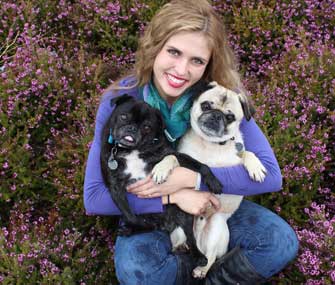How to Teach a Puppy to Love You
Published on June 17, 2015

Falling in love with a puppy can be effortless and instantaneous, and we tend to take it for granted that the puppy will reciprocate. I’ve been in puppy love countless times — and by that I mean I have fallen in love with multiple puppies. It is truly a hazard of my job: When I look into their round puppy dog eyes and I smell their sweet puppy breath, I’m hooked every time! But can you make a puppy fall in love with you?
I believe that in some cases, puppies feel love for a new family from the very beginning, in an instant connection that doesn’t need any encouragement to flourish. For other puppies, the initial connection might be less dramatic, but over time, it can grow into a strong devotion.
Some puppies don’t click with people right away; these dogs may benefit from a trainer’s professional insight, especially if they have challenges like anxiety, fear, shyness or aggression. If you feel that your puppy needs extra help, start by talking to your veterinarian for guidance or a referral to a behaviorist or positive-reinforcement trainer.
Recognizing Puppy Love
Our dogs can’t tell us that they love us with words, but I believe they show us their love in various ways. My Pug, Willy, shows his feelings for me in his behavior. He is my constant companion, choosing to be with me over everything else in his life, including other people, dogs and even food.
Willy is also tuned in to my moods and will come to comfort me when I’m upset or sad, often before I am even fully aware of what I’m feeling. I can tell by the way Willy looks at me, snuggles up to me and checks in with me throughout the day that he cares deeply for me.
Other dogs may show love in more active ways. You know your dog loves you when he greets you before everyone else, does a special doggie dance just for you or brings you his most treasured toys. He may also display specific signs of trust and security around you.
Training Your Puppy to Love You
Loving relationships with dogs are founded upon trust and mutual respect. Positive-reinforcement training is an important component of this relationship. My parents, Dr. Marty and Teresa Becker, have been working on this with QT, their new Chihuahua puppy. QT was rescued from a litter of puppies who had contracted distemper; QT was the only one to survive, and he spent a long time in intensive care at the Veterinary Teaching Hospital at Washington State University. Now that he’s home, my mom and dad are working to earn his trust and love through consistent positive interactions.
My parents have been patient with QT even when he makes mistakes. Through reward-based training, they are teaching him to trust them and to willingly do the things they ask him to do. Reward-based training has also given them a way to communicate with QT, which in turn reduces conflict and increases their bond with him.
They are also spending time doing the things QT likes to do. He enjoys being held and petted, and he looks forward to play time. Just like QT, every puppy has unique ways of bonding, from cuddling on the couch to exploring new sights and smells on a walk to learning a new trick or having playtime together. Doing the things your puppy likes to do helps him to associate you with those activities, which creates a positive feeling toward you. You might even say it can help him to fall in love with you!
Creating a Solid Foundation of Trust — and Love
While it makes sense to focus on activities your puppy likes when you’re trying to win his love, don’t limit yourself to doing only what he naturally enjoys. Making an effort to make activities the puppy may not initially like, such as being still for petting, more pleasant and less stressful can help him feel more comfortable, both with you and with the activity.
I worked with a Border Collie puppy who was constantly wired and energetic and who rarely settled down. He was especially sensitive to touch and disliked petting. His owner wanted to be able to pet the puppy without stressing him out; he also wanted to teach the dog to settle down when needed, rather than being in a constant state of arousal. I worked with the owner to provide the puppy with outlets for his energy and to reward calm behavior and petting with treats and extra play time. Eventually, the puppy learned to relax and began to happily anticipate being petted. These small behavior changes made a big — and very positive — difference in the puppy’s relationship with his person.
Building a positive relationship with your puppy can also help you remain close through transition periods in the puppy’s life, such as through his adolescence or the canine teen years. Common changes during adolescence include the puppy becoming more independent and more willing to test boundaries. A good relationship between puppy and person can help ease this otherwise-difficult phase. A relationship founded on reward-based training is particularly helpful in this part of a dog’s life, as it helps reduce conflict and promotes resolving problems in a kind and gentle manner.
Most of us love puppies, and I’ve found that puppies have just as much love to give us in return. With some dogs it’s just there, from that very first snuggle, while with others, it takes time and effort to build. But the investment is well worth the lifelong love and friendship you and your dog will find in each other.
More on Vetstreet:





